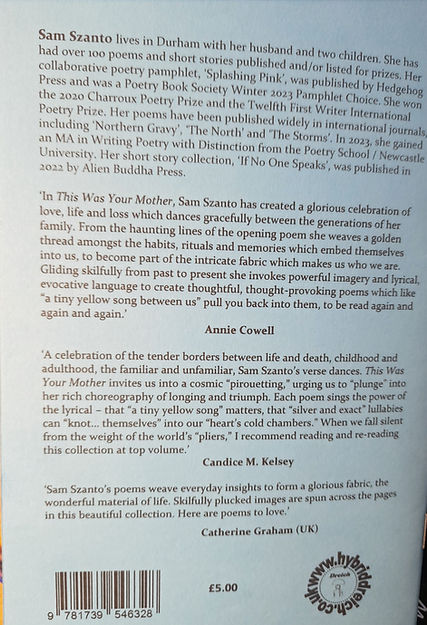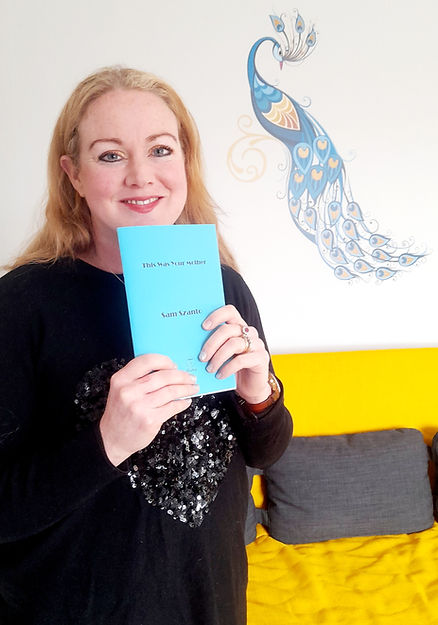20 Questions with... Juliet Fossey
- samszanto2
- Nov 7, 2022
- 4 min read

Juliet Fossey is a poet based in Cumbria, whose work is set against the backdrop of the Lake District. She enjoys working outside from notes and sketches prior to crafting poems into their finished form. Juliet often collaborates with other artists or writers and has recently worked on a puppetry inspired project, Beneath the Beacon, which celebrates local figures in Cumbria through music, puppets, archive and poetry.
Contact Juliet at: solarjuliet@aol.com
Instagram: https://www.instagram.com/juliets.plot/
Please introduce yourself. Where are you from? What was your life like growing up?
Juliet Fossey, Cumbria, I grew up in a small village on the Solway -it was a free-range childhood, running around outside, having adventures on the marsh.
Did you always want to be a writer? If you also work, what do you do / did you do?
Yes, I’ve always wanted to be a writer, I knew I liked poems and short stories as a child and longed to be able to write them. When I lived in London, I worked in Sales and Marketing which I now realise is mostly to do with communicating ideas.
Tell us about your most recently published work in a sentence.
I’ve had poems appear in editions of OWP (Obsessed with Pipework) an A5 paper magazine that publishes poems with ‘strangeness and charm’.
Outside the UK, you can find my most recent poem, ‘When all this is over’ in the anthology ‘Marriage’, A Lifespan Anthology by Slush Publishing.
What are you working on right now?
I’m completing an MA at Newcastle University in Writing Poetry. I am currently working on a sequence of poems responding to the relics recovered from the Franklin Expedition to find the Northwest Passage.
Do you have a writing routine, and if so, what is it?
I find settling down to the first half hour at a desk quite difficult. The task in hand inevitably seems daunting and my tools inadequate. Once I’ve sat down and started, I feel less frustrated. Processing my work into an orderly shape has always been hard - I have a study now and this makes it so much easier.
Where do you write – always in the same space, or different places? Can you write ‘on the move’?
I work best outside. As a neurodiverse writer, I think best when moving. Going for a walk is stimulating and calming at the same time. I try not to forget a notebook and pen, so that if something interesting arrives, it doesn’t get forgotten.
What advice do you have for other authors who are starting out? What is the best advice you’ve heard?
Keep going.
Do you enjoy doing live readings or are they a necessary evil – or somewhere in between?
I really enjoy live readings! I like chatting to people afterwards and hearing how a particular poem was of interest or prompted a memory.
Are there recurring themes in your work? Where do you feel these emanate from if so?
Loss is a big theme, but this is the same for most writers. To move forward, we often have to let go of something, so it’s natural that this theme recurs again and again.
Should writers have a moral purpose? What is the purpose of a writer in today’s society?
The ‘sponsored’ poet, as in a ‘poet in residence’ or a poet in receipt of grant funding does have a responsibility to the funding source in some way. Poets continue to operate at the highest level of state activity; Amanda Gorman, Simon Armitage being recent examples. However, poetry is powerful on its own and it’s important that poets find as many narratives as possible. We need play as well as purpose!
Do you write between genres or not?
Not really, as I predominantly write poetry.
Which living writers do you most admire?
M.R Peacocke for finding the ‘right’ word. Sharon Olds for being bristling brilliant, John Hegley for creating an audience outside the poetry world. Helen Farish for her exquisite line breaks. There are many others.
Which dead writers do you most admire?
Prevert, Maupassant, Yevtushenko, Camus, Bishop, I come back to these writers time after time. I have no explanation for why none of them are British!
What’s the book you wish you’d written?
A Very Easy Death, by Simone de Beauvoir, it’s controlled, understated and relatable. Oh, and of course, it deals with loss.
What other external influences do you have: nature/place, music etc?
All of my poems are set within nature in some way. Growing up (and now living) in a rural village means that all events are seasonal and all adventures, weather dependent.
Do you suffer from ‘writer’s block’ and how do you overcome it if so?
I rarely get blocked, there is always a hill to climb!
What’s been your favourite reaction to your writing?
Being accepted by a first publication made me feel hugely validated. It was enough, for quite a while - just to know it was possible!
How do your family and friends feel about your writing?
They are enthusiasts, but as my writing has evolved, they find it harder to keep up. This worry’s me – perhaps I’m overthinking things.
Do you have a favourite bookshop?
Any bookshop! Although, I do particularly love a chaotic second-hand one with wobbly ladders.
How do you see the future of writing? Will we become more or less dependent on Amazon?
I hope we’re not ever more dependent on Amazon, have you seen the dystopian scale of those distribution hubs?! Buying direct from publishers when possible, and through second-hand independents has never been so vital.






